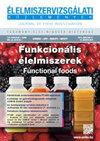In vitro evaluation of certain probiotic properties of lactic acid bacteria isolates
Q4 Agricultural and Biological Sciences
引用次数: 0
Abstract
Bacteria carrying genes responsible for antibiotic resistance cannot be used in food production. For this reason,exploring the antibiotic resistance profile of probiotic candidates and the antimicrobial substances theyproduce are essential for probiotic strain selection. The aim of this study was to develop and evaluate additionalelements of a complex in vitro test system for rapid and efficient selection of a large number of putativeprobiotic isolates. In a previous work, we had tested bacterial strains (n=217) isolated from Transylvanian rawsheep milk, cultured sheep milk, and sheep cheese samples and we reduced the sample number to a totalof six Gram-positive, non-hemolytic, catalase-negative, well-aggregating, good acid and bile acid toleratingstrains. In this research, we investigated the antibiotic resistance and antimicrobial production capacity of thepre-selected strains (n=6). The antimicrobial activity of the isolates was determined by the agar well diffusionassay. Strains E15, E66, E173, E198, and E216 were found to inhibit the growth of both Salmonella EnteridisATCC 13076 and the control strain (i.e., Lactobacillus acidophilus ATCC 4356). Antibiotic resistance testswere performed by the agar disk diffusion method. All six isolates belonging to the species of Levilactobacillusbrevis and Lactiplantibacillus plantarum were found to be resistant to several antibiotics and, therefore,cannot be used for the manufacture of commercial probiotic products. In conclusion, our in vitro test systemproved to be capable of effectively screening out unsafe isolates.乳酸菌分离物某些益生菌特性的体外评价
携带抗生素耐药性基因的细菌不能用于食品生产。因此,探索益生菌候选菌的耐药性特征及其产生的抗菌物质对益生菌菌株的选择至关重要。本研究的目的是开发和评估一个复杂的体外测试系统的其他元素,以快速有效地选择大量假定的益生菌分离物。在之前的工作中,我们测试了从特兰西瓦尼亚生羊奶、培养羊奶和羊奶酪样品中分离的细菌菌株(n=217),并将样本数量减少到革兰氏阳性、非溶血性、过氧化氢酶阴性、良好聚集、良好耐酸和胆汁酸的菌株共6株。在本研究中,我们调查了预先选择的菌株(n=6)的抗生素耐药性和抗菌药物生产能力。采用琼脂孔扩散法测定菌株的抑菌活性。菌株E15、E66、E173、E198和E216均能抑制肠沙门氏菌ATCC 13076和对照菌株(即嗜酸乳杆菌ATCC 4356)的生长。采用琼脂盘扩散法进行抗生素耐药试验。所有6株属短Levilactobacillusbrevis和植物乳酸杆菌(Lactiplantibacillus plantarum)的菌株均被发现对几种抗生素具有耐药性,因此不能用于生产商业益生菌产品。总之,我们的体外检测系统能够有效地筛选出不安全的分离株。
本文章由计算机程序翻译,如有差异,请以英文原文为准。
求助全文
约1分钟内获得全文
求助全文
来源期刊

Elelmiszervizsgalati Kozlemenyek
Agricultural and Biological Sciences-Food Science
CiteScore
0.20
自引率
0.00%
发文量
10
期刊介绍:
The main topics, which we are waiting to issue in our paper, are the next:
Chemical food and feed analysis (ingredients, macro-, mezo- and micro components, harmful pollutants, processing by-products etc.);
General food and feed chemistry related to several food and feed processing technologies;
Food and feed toxicology;
Relation between the agro technology and the food chain safety;
Microbiological food and feed analysis (pathogens, spoilage bacteria, general food/feed microbiology, microorganisms of several processing technologies etc.);
Rapid food and feed test methods (“classical” and instrumental technologies);
Molecular biological food and feed analysis (GMOs, GMO analysis etc.)
Effects of genetically modified organisms on the entire food chain and the environment;
Sensorial food and feed analysis;
Investigation of non-food products (mainly several disinfectants, production aids);
Investigation of food contact materials (migration tests, residual investigations, etc.);
Legislation topics, regulation of the whole food chain on the territory of food and feed processing, retailing, distribution (European, Hungarian, other countries);
Standardisation news and comments on the topics of whole food chain;
Other topics, results of investigations etc. (the Editorial Board keeps the right to measure the manuscripts arriving to the Editorial Office according to the principles of the journal).
 求助内容:
求助内容: 应助结果提醒方式:
应助结果提醒方式:


